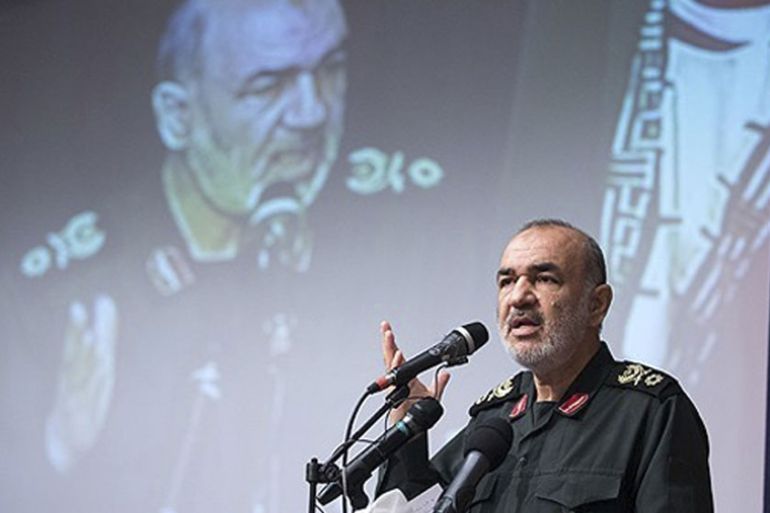Iran’s supreme leader appoints new Revolutionary Guard chief
Appointment of General Hossein Salami as head of the elite IRGC comes weeks after it was dubbed a terrorist group by US.

Iran’s supreme leader has appointed General Hossein Salami to head the country’s Iranian Revolutionary Guard Corps (IRGC), promoting him to the rank of major general, the semi-official Tasnim news agency has reported.
Ayatollah Ali Khamenei made the announcement in a decree on Sunday, saying the decision to name IRGC chief was made in view of Salami’s work ethic and experience.
Keep reading
list of 4 itemsTightrope: Jordan’s balancing act between Iran and Israel
What does Israel want to do after Iran’s drone and missile attacks?
Mexico to Iran, why are attacks on embassies so controversial?
IRGC Brigadier General Hussain Salami, given your qualities and valuable experiences in major managerial responsibilities with various revolutionary and volunteering sectors of IRGC, I appoint you as the commander-in-chief of the IRGC, granting you the rank of Major General.
— Khamenei.ir (@khamenei_ir) April 21, 2019
Iranian Foreign Affairs Minister Mohammad Javad Zarif congratulated Salami following his promotion, wishing him “success and great achievement in this great position”.
Meanwhile, Salami’s predecessor, Major General Mohammad Ali Jafari, was named head of Hazrat Baqiatollah al-Azam Cultural and Social Headquarters.
No reason was given for Jafari’s dismissal, who was appointed IRGC chief in 2007.
Earlier in April, US President Donald Trump designated the IRGC a foreign “terrorist organisation”, an unprecedented step that drew condemnation from Iran.
Tehran immediately announced retaliatory measures, declaring the United States a “state sponsor of terrorism” and US forces in the region “terrorist groups”, state media reported.
Iran also condemned the US decision as an illegal act prompted by Tehran’s regional influence and “success in fighting against Islamic State”, Iranian state TV said, referring to the Islamic State of Iraq and the Levant (ISIL or ISIS).
On April 13, Salami was quoted by Tasnim as saying that he and the IRGC were proud of being designated a “terrorist group” by Washington.
The designation allows the US to deny entry to people found to have provided the IRGC with material support or prosecute them for sanctions violations. That could include European and Asian companies and businesspeople who deal with the IRGC’s many affiliates.
It also may complicate diplomacy. Without exclusions or waivers to the designation, US troops and diplomats could be barred from contact with Iraqi or Lebanese authorities who interact with IRGC officials or surrogates.
Those concerns have in part dissuaded previous administrations from taking the step, which has been considered for more than a decade.